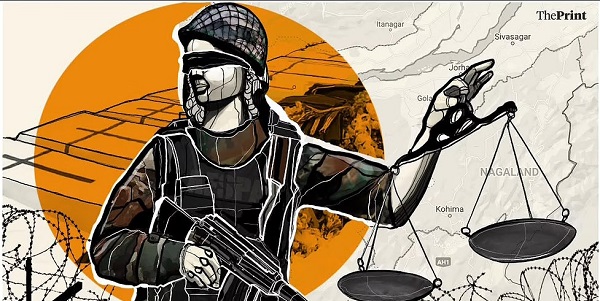AFSPA Panel

Why was AFSPA imposed in the first place?
- In Nagaland, the insurgency issue has been afflicting the state since independence. The insurgents have bases across the border in Myanmar.
- Insurgency has claimed hundreds of lives. It has turned Nagaland into a garrisoned state.
- The task of securing peace in the state against the insurgents was given to the Army.
- To provide legal protection to the Army, which has to function in a war-like situation against guerrilla outfits that are well trained and well equipped, the AFSPA or Armed Forces Special Powers Act was enacted.
- Apart from Nagaland, the Act is also in force in Assam, Manipur and 3 districts of Arunachal Pradesh.
About the new panel:
- Recently the centre decided to constitute a panel to consider the withdrawal of AFSPA from Nagaland.
- It is to be headed by the Additional Secretary (Northeast) of the Ministry of Home Affairs.
- It will also include the Chief Secretary and Director General of Police of Nagaland.
Why is withdrawal being sought?
- The immediate trigger is the recent botched military operation in the Mon district, on December 4th. It left 6 civilians dead and 8 more were killed in the violence that erupted in its aftermath. The incident has led to the civil society and the political parties in the state demanding the withdrawal of the Act.
- On December 20th, the state Assembly passed a resolution unanimously calling for the repeal of AFSPA, following massive street protests by the civil societies.
- Like in other parts of the northeast and in J&K, AFSPA is perceived to give immunity to security personnel who target civilians under the guise of counter-terrorism operations in Nagaland.
- In any case, AFSPA is a colonial-era legislation that overrides the civil administration’s authority and gives extraordinary powers to the security personnel. Such a law mustn’t be enforced in perpetuity.
- The Justice Jeevan Reddy Committee, in 2005, had called the Act ‘highly undesirable’ and recommended its repeal. However, the Act continued to be in place due to resistance from the Army.
- In 1997, a ceasefire agreement was signed between the government and the NSCN-IM (a powerful insurgent group in Nagaland). Over the years, it has facilitated conversation towards ending insurgency in the region.
- The subsequent Framework Agreement, signed between the government and NSCN-IM in 2015, had raised the hope of a resolution- not only of the insurgency issue but also the issue of Naga sovereignty.
- The recent events (of December 4th and 5th ) has threatened to throw a spanner in the talks and is now endangering the progress made in the last 2 decades.
What is the way ahead?
- Now, the challenge is to revive the spirit of dialogue to bring in peace. The onus is on the central government to win back the trust of the people.
- The Army has expressed deep regret over the loss of lives and has announced a probe into the incident. The Nagaland government announced that a court of inquiry is to initiate disciplinary proceedings against the security personnel involved in the December 4th
- The constitution of the panel to looking to the possibility of withdrawing AFSPA is a step in the right direction.
- The panel is to submit its report in 45 days. It needs to keep in mind the groundswell for peace in the state- a result of the work put in by the civil society like the Naga Mothers Association.
- In the recent times, AFSPA has been withdrawn from Tripura (in May 2015), Meghalaya (April 2018) and districts in Assam and Arunachal Pradesh. This is in response to the decline in violence in large parts of the northeast.
- The Naga insurgency is a more complex issue. However, a new generation has come of age in the state and it is more invested in peace and prosperity. This generation’s future needs to be safeguarded from the vicious cycle of violence that has adversely affected the previous generations.
Conclusion:
The constitution of the AFSPA panel is a welcome step. While compiling its report, the panel needs to weigh the region’s need for peace as much as it weighs the region’s need for security against insurgency. The report and the subsequent action by the government also has major implications for the crucial Naga peace talks.
Referred Sources
If you like this post, please share your feedback in the comments section below so that we will upload more posts like this.

